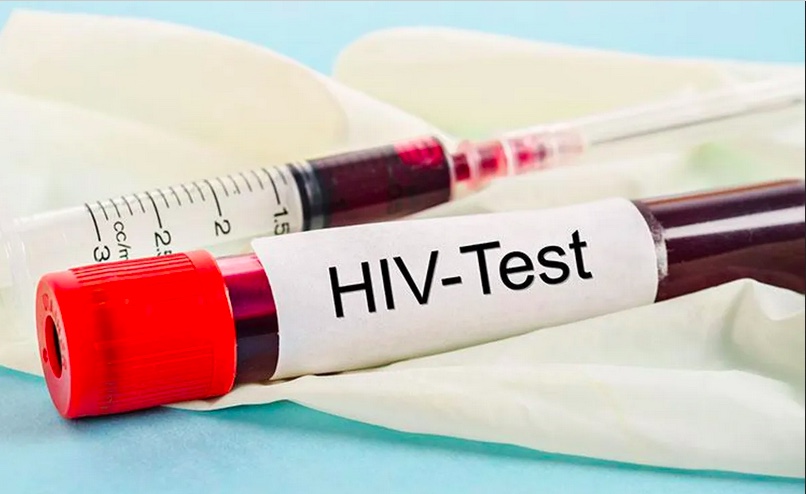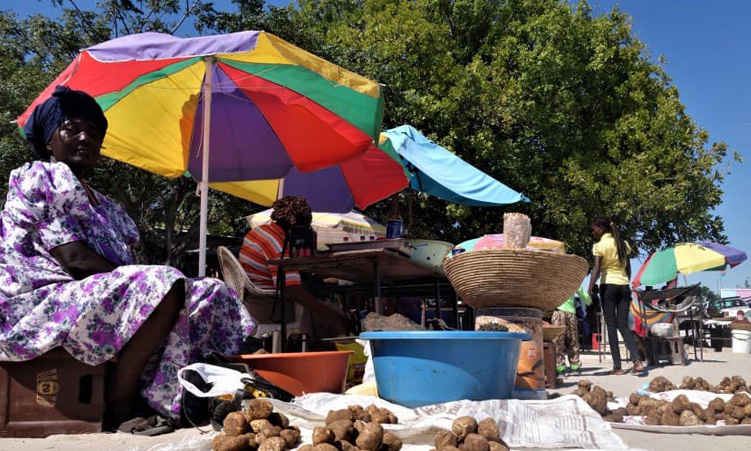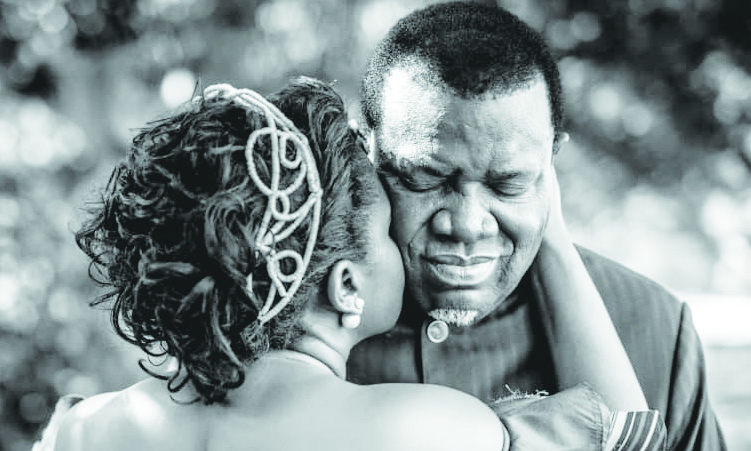OUT of desperation and fear that ‘her future’ might come back to haunt her, Susanna Nowases has torn a page of the alphabet from a magazine and stuck it on the hole-poked iron sheet wall of her Goreangab home on the fringes of the Goreangab settlement.
She then used the alphabet to teach two of her seven children “at least how to spell their names”. “Imagine, Cassius is 12 and he has never even seen Grade 1,” said their mother last week.”What will they think of me one day? That I never cared about their education? They could become revengeful and hate their mother”, said Nowases with a cracking voice as she fights back the tears.The jolly Avrey Nowaseb is now 10 years old.His brother Cassius is turning 12.None of them have been to school but they have always lived within a kilometre of the nearest primary school.Every mid-week morning, the two brothers will mill around their home of iron sheets and cardboard boxes.Often they will play with a make-shift bicycle or listen to children singing at the crèche opposite their house – in blissful ignorance of what their own future holds for them.Their mother’s left arm and leg dangle while she steadies her frail body after a cup of tea.”What is painful, is that I cannot even make myself a cup of tea.I wasn’t always like this,” she begins the story of how she has now become a helpless TB-ridden paraplegic.Things turned for the worst in 1989 after Nowases’ husband left her and their four children in their Katutura home.She was a domestic worker and could not afford to pay all her bills despite the N$30 maintenance a month for every child that the courts ordered the husband to pay – which he did, but not always on time.Municipal bills piled up to eventually exceed N$20 000.Debt spiralled out of control trapping the family in a catch-22 situation.But Nowases still managed to keep her first four children – her eldest son Edwin (25), daughter Roseline (23), middle son Manly (22) and youngest daughter Jessica Melissa (18) – in school, while continuing to scrape for a living.Then the Windhoek City Council attached the house and threatened to evict them.By 1995, Nowases had lost the steady job she had when the Namutoni Ice Cream and Catering firm shut down.She sold the brick house in for N$35 000, paid of all debt she owed and, in March 1996, moved to what was formerly the squatter area not far from the Goreangab Dam.Nowases bought herself a plot at N$8 900 with a deposit of more than N$1 000 and N$181 monthly instalments for the piece of land alone.She then bought iron sheets and planks to build her new home.Without a steady job, exorbitant municipal rates and taxes accumulated once more.”The debt always starts with the municipality,” said Nowases.”It’s not just the land, water or waste removal, they charge me for sewerage, but I don’t even have a toilet or drainage system in my yard.”Lack of money meant she could not send the younger children to school.Three older ones dropped out for the same reason.For Cassius and Avrey, she tried Olof Palme, Moses van der Byl, Tobias Hainyeko and another school in Wanaheda from 1999 until this year – without success.The schools referred her to the welfare department so that she could prove that she was unable to pay.The welfare officials told her to first find them a school.They also said that the State could not help much because the father of the three last children – Cassius, Avrey and Jerome (7) – was still alive, though mostly unemployed and did not live with them.He died last week.”Pardon me.I forgot to mention that.We are burying him tomorrow [Saturday].Perhaps they will help me now that he is no longer alive.”On Friday afternoon, Nowases’s two daughters have just returned from the physiotherapy unit of the State Hospital with a hired wheel-chair for the funeral.Her entire left side was paralysed in 2001.”Perhaps because of all the problems my blood [pressure] could not take it anymore.”The following year she was diagnosed with tuberculosis, adding to her woes.Meanwhile, the reasons for keeping the boys out of school changed as the clock ticked on.The 18-year-old Jessica, who dropped out of Grade 9 because she could not afford school, tried in vain to enrol Cassius and Avrey.They were too old to start school, she was told.Jerome, the last born, was accepted at Tobias Hainyeko Primary School.Nowases later learnt that a neighbour’s daughter, who is the same age as Avrey, was enrolled after paying a N$200 fee at one of the schools that had turned him away.Veiue Kangueehi of the Ministry of Basic Education and Culture on Friday said: “Schools turning children away because of age or [because parents cannot pay] are guilty of misconduct.”Perhaps, because she sent the petite Jessica, the teachers thought Nowases was not “seriously concerned” about putting her children in school.If only they knew that, apart from a lack of money, she can hardly walk far enough to catch a taxi or run around to fight for the education of her children, as she eked out a living, she mused.The youngest daughter, Jessica, has resorted to playing mother as a result of her own mom’s disability.Jessica, who left school after a spell walking to Khomasdal barefoot, thought it would be easy to find a job and get her brothers to formal education.”Nowadays, life without school is not life,” says Nowases.She managed Standard 6 only and knows it is tough making a living with that.The accumulated debt to the municipality for the land alone now stands at more than N$22 000.The water was cut off long ago in 2000 when Nowases was unable to raise N$6 000 to keep the tap running.It’s another catch-22 all over again.When kind people give her food, she sometimes has no water to cook it with.When she does not eat she can’t take the TB tablets regularly.In fact, Nowases says she stopped her TB treatment five months ago because she has no constant supply of food and water.”What really hurts is that I cannot see my way out of this debt.It’s always the municipality.The municipality is sucking me dry,” she said on Friday.”There are days that I want to kill myself, thinking that perhaps only then will these poor children get help, but that’s no guarantee.What will happen to my children?””Imagine, Cassius is 12 and he has never even seen Grade 1,” said their mother last week.”What will they think of me one day? That I never cared about their education? They could become revengeful and hate their mother”, said Nowases with a cracking voice as she fights back the tears.The jolly Avrey Nowaseb is now 10 years old.His brother Cassius is turning 12.None of them have been to school but they have always lived within a kilometre of the nearest primary school.Every mid-week morning, the two brothers will mill around their home of iron sheets and cardboard boxes.Often they will play with a make-shift bicycle or listen to children singing at the crèche opposite their house – in blissful ignorance of what their own future holds for them.Their mother’s left arm and leg dangle while she steadies her frail body after a cup of tea.”What is painful, is that I cannot even make myself a cup of tea.I wasn’t always like this,” she begins the story of how she has now become a helpless TB-ridden paraplegic.Things turned for the worst in 1989 after Nowases’ husband left her and their four children in their Katutura home.She was a domestic worker and could not afford to pay all her bills despite the N$30 maintenance a month for every child that the courts ordered the husband to pay – which he did, but not always on time.Municipal bills piled up to eventually exceed N$20 000.Debt spiralled out of control trapping the family in a catch-22 situation.But Nowases still managed to keep her first four children – her eldest son Edwin (25), daughter Roseline (23), middle son Manly (22) and youngest daughter Jessica Melissa (18) – in school, while continuing to scrape for a living.Then the Windhoek City Council attached the house and threatened to evict them.By 1995, Nowases had lost the steady job she had when the Namutoni Ice Cream and Catering firm shut down.She sold the brick house in for N$35 000, paid of all debt she owed and, in March 1996, moved to what was formerly the squatter area not far from the Goreangab Dam.Nowases bought herself a plot at N$8 900 with a deposit of more than N$1 000 and N$181 monthly instalments for the piece of land alone.She then bought iron sheets and planks to build her new home.Without a steady job, exorbitant municipal rates and taxes accumulated once more.”The debt always starts with the municipality,” said Nowases.”It’s not just the land, water or waste removal, they charge me for sewerage, but I don’t even have a toilet or drainage system in my yard.”Lack of money meant she could not send the younger children to school.Three older ones dropped out for the same reason.For Cassius and Avrey, she tried Olof Palme, Moses van der Byl, Tobias Hainyeko and another school in Wanaheda from 1999 until this year – without success.The schools referred her to the welfare department so that she could prove that she was unable to pay.The welfare officials told her to first find them a school.They also said that the State could not help much because the father of the three last children – Cassius, Avrey and Jerome (7) – was still alive, though mostly unemployed and did not live with them.He died last week.”Pardon me.I forgot to mention that.We are burying him tomorrow [Saturday].Perhaps they will help me now that he is no longer alive.”On Friday afternoon, Nowases’s two daughters have just returned from the physiotherapy unit of the State Hospital with a hired wheel-chair for the funeral.Her entire left side was paralysed in 2001.”Perhaps because of all the problems my blood [pressure] could not take it anymore.”The following year she was diagnosed with tuberculosis, adding to her woes.Meanwhile, the reasons for keeping the boys out of school changed as the clock ticked on.The 18-year-old Jessica, who dropped out of Grade 9 because she could not afford school, tried in vain to enrol Cassius and Avrey.They were too old to start school, she was told.Jerome, the last born, was accepted at Tobias Hainyeko Primary School.Nowases later learnt that a neighbour’s daughter, who is the same age as Avrey, was enrolled after paying a N$200 fee at one of the schools that had turned him away.Veiue Kangueehi of the Ministry of Basic Education and Culture on Friday said: “Schools turning children away because of age or [because parents cannot pay] are guilty of misconduct.”Perhaps, because she sent the petite Jessica, the teachers thought Nowases was not “seriously concerned” about putting her children in school.If only they knew that, apart from a lack of money, she can hardly walk far enough to catch a taxi or run around to fight for the education of her children, as she eked out a living, she mused.The youngest daughter, Jessica, has resorted to playing mother as a result of her own mom’s disability.Jessica, who left school after a spell walking to Khomasdal barefoot, thought it would be easy to find a job and get her brothers to formal education.”Nowadays, life without school is not life,” says Nowases.She managed Standard 6 only and knows it is tough making a living with that.The accumulated debt to the municipality for the land alone now stands at more than N$22 000.The water was cut off long ago in 2000 when Nowases was unable to raise N$6 000 to keep the tap running.It’s another catch-22 all over again.When kind people give her food, she sometimes has no water to cook it with.When she does not eat she can’t take the TB tablets regularly.In fact, Nowases says she stopped her TB treatment five months ago because she has no constant supply of food and water.”What really hurts is that I cannot see my way out of this debt.It’s always the municipality.The municipality is sucking me dry,” she said on Friday.”There are days that I want to kill myself, thinking that perhaps only then will these poor children get help, but that’s no guarantee.What will happen to my children?”
Stay informed with The Namibian – your source for credible journalism. Get in-depth reporting and opinions for
only N$85 a month. Invest in journalism, invest in democracy –
Subscribe Now!






